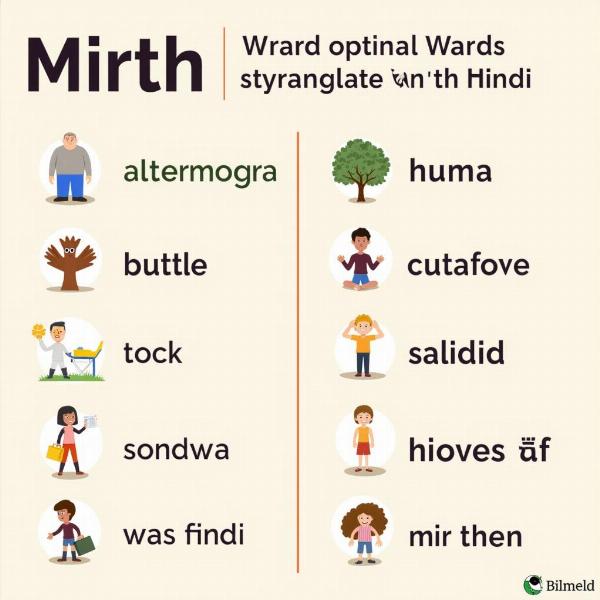Mirth, a word often encountered in classic literature and formal settings, evokes a sense of vibrant, shared joy. But what exactly does mirth mean in Hindi? This article delves into the various nuances of mirth, its Hindi translations, cultural contexts, and practical usage. We will explore how this emotion manifests in Indian traditions and celebrations, providing a comprehensive understanding of this delightful word.
Exploring the Depths of Mirth
Mirth describes a feeling of lighthearted gaiety and amusement, often accompanied by laughter and cheerful company. It goes beyond a simple smile; it’s a state of joyous exuberance that can be infectious. Think of the unrestrained laughter shared amongst friends, the celebratory atmosphere of a festival, or the sheer joy experienced during a playful moment. Understanding the true essence of mirth allows us to appreciate its significance in human interactions and cultural expressions.
Mirth Meaning in Hindi: A Spectrum of Translations
While there isn’t one single perfect Hindi equivalent for “mirth,” several words capture its various facets. Here are some common translations:
- हर्ष (Harsh): This is perhaps the closest equivalent, denoting joy, gladness, and exhilaration.
- उल्लास (Ullas): This word signifies delight, cheerfulness, and high spirits, often associated with celebrations and festivities.
- प्रमोद (Pramod): This term represents enjoyment, pleasure, and delight, often implying a sense of satisfaction and contentment.
- आनंद (Anand): While generally translated as “bliss” or “happiness,” Anand can also encompass the joyous aspect of mirth, especially in spiritual contexts.
The choice of translation depends on the specific context and the nuance you want to convey. For instance, “harsh” might be suitable for describing the mirth of children at play, while “pramod” might be more appropriate for the quiet mirth of a contented individual.
 Hindi Translations of Mirth
Hindi Translations of Mirth
Mirth in Indian Culture: Celebrations and Traditions
Mirth is an integral part of Indian culture, woven into the fabric of its numerous festivals and celebrations. From the vibrant colors of Holi to the joyous dances of Navratri, mirth finds expression in various forms. These celebrations provide a space for shared joy, strengthening community bonds and reinforcing cultural values. The concept of mirth is also deeply embedded in Indian mythology and folklore, often depicted through stories of gods and goddesses engaging in playful banter and lighthearted activities.
Practical Usage and Examples
Understanding the context is key to using “mirth” effectively. Here are some examples:
- “The room was filled with mirth as the comedian delivered his punchline.”
- “Her eyes sparkled with mirth as she recounted the amusing anecdote.”
- “The festival was a celebration of life, filled with music, dance, and unrestrained mirth.”
Mirth and its Relation to Humor
While mirth is often associated with humor, it’s important to distinguish between the two. Humor is the stimulus, the joke or the funny situation, while mirth is the response, the feeling of amusement and laughter it evokes. A good sense of humor can certainly be a source of mirth, but mirth can also arise from other sources, such as shared experiences, playful interactions, and even a sense of accomplishment.
Mirth Meaning in Hindi: FAQs
- What is the most common Hindi word for mirth? Harsh (हर्ष) is often considered the closest equivalent.
- How is mirth expressed in Indian culture? Through festivals, celebrations, storytelling, and social interactions.
- Is mirth the same as happiness? While related, mirth specifically refers to lighthearted joy and amusement, while happiness encompasses a broader range of positive emotions.
- Can mirth exist without laughter? While laughter is a common manifestation of mirth, it can also be expressed through other forms of joyful expression.
- Why is understanding the meaning of mirth important? It enhances our appreciation of literature, cultural expressions, and the nuances of human emotion.
- How can I use the word “mirth” in a sentence? “The children’s mirth filled the playground.”
- Are there any other Hindi words related to mirth? Yes, words like khushi (खुशी), anand (आनंद), and prasannata (प्रसन्नता) are also related to joy and happiness.
Conclusion
Mirth, whether expressed as harsha, ullas, or pramod in Hindi, is a beautiful emotion that enriches our lives. Understanding its nuances allows us to appreciate its significance in various contexts, from everyday interactions to cultural celebrations. By exploring the meaning of mirth in Hindi, we gain a deeper understanding of the rich tapestry of human emotion and the cultural expressions of joy.
Meaning-Hindi.in: Your Trusted Partner for Hindi Translations
Meaning-Hindi.in is your one-stop solution for all your Hindi translation needs. We offer a wide range of professional translation services, specializing in business, legal, technical, website localization, educational, and specialized content. Our team of expert linguists ensures accurate and culturally sensitive translations, catering to diverse client requirements. Whether you need a quick translation or a complex project, Meaning-Hindi.in delivers high-quality results. Contact us today at [email protected] or +91 11-4502-7584 for a seamless translation experience.